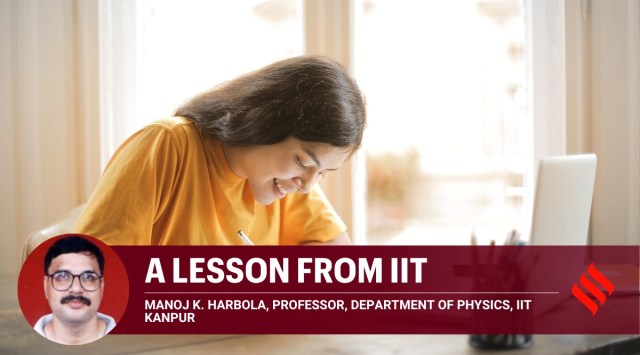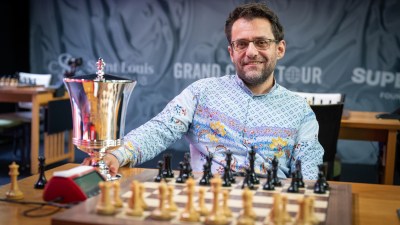A Lesson from IIT | Disciplined schedule and conceptual understanding are key for JEE preparation, IIT Kanpur prof writes
"The first thing that students should do is master the concepts. They should then proceed to solve problems from well-vetted books written by experts,” writes Harbola
 Following the strategies outlined in in this column would make your preparations for any competition comfortable.
Following the strategies outlined in in this column would make your preparations for any competition comfortable. (A Lesson from IIT is a weekly column by an IIT faculty member on learning, science and technology on campus and beyond. The column appears every Friday)
— Manoj Harbola
I will start by recalling a conversation a few years ago I was having with students of IIT Kanpur’s Hall of Residence III, of which I was a warden at that time. During the discussion, I posed a question to the students: “How many of you still follow the daily routine you had in school?” I was very specific with that question – I wanted to know who were getting up in time to get ready to go to classes, attending them regularly, participating in extra-curricular activities, taking proper rest, doing the homework for the day, going out to play in the evening and finally finishing all the work for the day and then do whatever extra reading or work one wanted to do before going to bed.
Only two students raised their hands. I asked them what their Cumulative Performance Index (CPI) was. One said it is 9.8 and it was a little higher (maximum CPI at IIT, Kanpur is 10).
The story above is quite revealing. It tells about how effectively a disciplined life built around school education prepares students to grow well into responsible young adults ready for their university education. Evidently, performing well in competitive examinations is a byproduct of making an effort to grow into a young person whose final goal that of leading a well-rounded life. In this regard, it also helps to develop a sense of the kind of person would they like to see themselves as a few years later.
But here is a dilemma faced by a majority of students. With so much competition around, you tend to devote most of your time in preparing only for competitive examinations and do nothing else. This may sometimes also make you feel overwhelmed and give up. How do you then manage a rigorous schedule? The answer lies in taking a disciplined and efficient approach and that is the topic of discussion here.
While preparing for a competition, many students have an impression that they should be able to solve very complicated problems and therefore start by trying to do so. However, that makes your efforts inefficient. The first thing you should do is to master the concepts and solve problems from well-vetted books written by experts in consultation with school teachers, that also take into account the cognitive abilities of students at a certain level. NCERT textbooks in general fulfill these criteria well.
Consequently, it is recommended that students start their journey towards competition for admission to places of higher education with these books and then build up on that. Many JEE Main toppers of 2023, who have spoken to The Indian Express also give similar tips. The question arises: Since the number of problems in these books is limited, how does one go beyond the first step and get enough practice to solve complex problems? We address this next.
While solving a problem, try to extend it to more complicated situations by asking further questions. Ask what would happen if the conditions given in the problem were altered, or if the assumptions made in the problem were different. By doing so you will be challenging yourself to see the problem from a broader perspective. In the process, newer problems are created and solved. Furthermore, doors to creating and understanding many more are opened. This allows you to set up a test paper for yourself. But do not stop here; with the kind of training that you would have given yourself, you are now ready to venture further. Therefore, you should move on to tackle more difficult problems and test papers from other resources. Along the way, take a short break from studies when you feel overburdened. You may still ask: How would I get the confidence that I have solved a sufficiently large number of problems and will not be in a disadvantageous position? I comment on this next.
During your schooling years, both the time available and the number of problems that can be solved in that time is limited. It is therefore impossible to learn about and remember ways in which all kinds of different problems are to be solved. Rather than solving an enormously large number of problems, a more effective strategy is to focus on understanding the basic principles and learning how to dissect a given problem. The former is like trying to learn a language well by reading all sentences written in it, which just cannot be done. However, having learnt the basics of a language properly, you understand and write in it well. And then you keep improving with time. Similarly, mastering a subject for a competition or otherwise is an ongoing process and is to be done in a systematic step-by-step manner. Since the speed for doing so varies for each person, it is important to pace oneself accordingly.
Following the strategies outlined in this column would hopefully make your preparations for any competition comfortable and enable you to negotiate through them with ease. My best wishes to all the young readers.
(The author is Professor, Department of Physics, IIT Kanpur)
- 01
- 02
- 03
- 04
- 05































